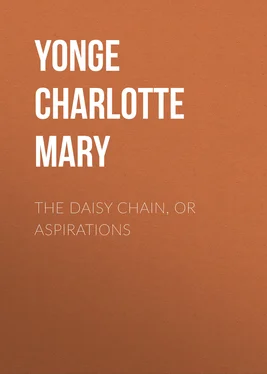Charlotte Yonge - The Daisy Chain, or Aspirations
Здесь есть возможность читать онлайн «Charlotte Yonge - The Daisy Chain, or Aspirations» — ознакомительный отрывок электронной книги совершенно бесплатно, а после прочтения отрывка купить полную версию. В некоторых случаях можно слушать аудио, скачать через торрент в формате fb2 и присутствует краткое содержание. Жанр: foreign_prose, literature_19, Европейская старинная литература, foreign_antique, на английском языке. Описание произведения, (предисловие) а так же отзывы посетителей доступны на портале библиотеки ЛибКат.
- Название:The Daisy Chain, or Aspirations
- Автор:
- Жанр:
- Год:неизвестен
- ISBN:нет данных
- Рейтинг книги:5 / 5. Голосов: 1
-
Избранное:Добавить в избранное
- Отзывы:
-
Ваша оценка:
- 100
- 1
- 2
- 3
- 4
- 5
The Daisy Chain, or Aspirations: краткое содержание, описание и аннотация
Предлагаем к чтению аннотацию, описание, краткое содержание или предисловие (зависит от того, что написал сам автор книги «The Daisy Chain, or Aspirations»). Если вы не нашли необходимую информацию о книге — напишите в комментариях, мы постараемся отыскать её.
The Daisy Chain, or Aspirations — читать онлайн ознакомительный отрывок
Ниже представлен текст книги, разбитый по страницам. Система сохранения места последней прочитанной страницы, позволяет с удобством читать онлайн бесплатно книгу «The Daisy Chain, or Aspirations», без необходимости каждый раз заново искать на чём Вы остановились. Поставьте закладку, и сможете в любой момент перейти на страницу, на которой закончили чтение.
Интервал:
Закладка:
Ethel lingered with her sister till Harry and Mary came up with Margaret’s tea, and summoned her, and she crept downstairs, and entered the room so quietly, that she was hardly perceived behind her boisterous brother. She knew her eyes were in no presentable state, and cast them down, and shrank back as Mr. Wilmot shook her hand and greeted her kindly.
Mr. Wilmot had been wont to come to tea whenever he had anything to say to Dr. or Mrs. May, which was about once in ten or twelve days. He was Mary’s godfather, and their most intimate friend in the town, and he had often been with them, both as friend and clergyman, through their trouble—no later than Christmas Day, he had come to bring the feast of that day to Margaret in her sick-room. Indeed, it had been chiefly for the sake of the Mays that he had resolved to spend the holidays at Stoneborough, taking the care of Abbotstoke, while his brother, the vicar, went to visit their father. This was, however, the first time he had come in his old familiar way to spend an evening, and there was something in the resumption of former habits that painfully marked the change.
Ethel, on coming in, found Flora making tea, her father leaning back in his great chair in silence, Richard diligently cutting bread, and Blanche sitting on Mr. Wilmot’s knee, chattering fast and confidentially. Flora made Harry dispense the cups, and called every one to their places; Ethel timidly glanced at her father’s face, as he rose and came into the light. She thought the lines and hollows were more marked than ever, and that he looked fatigued and mournful, and she felt cut to the heart; but he began to exert himself, and to make conversation, not, however, about Cocksmoor, but asking Mr. Wilmot what his brother thought of his new squire, Mr. Rivers.
“He likes him very much,” said Mr. Wilmot. “He is a very pleasing person, particularly kind-hearted and gentle, and likely to do a great deal for the parish. They have been giving away beef and blankets at a great rate this Christmas.”
“What family is there?” asked Flora.
“One daughter, about Ethel’s age, is there with her governess. He has been twice married, and the first wife left a son, who is in the Dragoons, I believe. This girl’s mother was Lord Cosham’s daughter.”
So the talk lingered on, without much interest or life. It was rather keeping from saying nothing than conversation, and no one was without the sensation that she was missing, round whom all had been free and joyous—not that she had been wont to speak much herself, but nothing would go on smoothly or easily without her. So long did this last, that Ethel began to think her father meant to punish her by not beginning the subject that night, and though she owned that she deserved it, she could not help being very much disappointed.
At length, however, her father began: “We wanted you to talk over a scheme that these young ones have been concocting. You see, I am obliged to keep Richard at home this next term—it won’t do to have no one in the house to carry poor Margaret. We can’t do without him anyway, so he and Ethel have a scheme of seeing what can be done for that wretched place, Cocksmoor.”
“Indeed!” said Mr. Wilmot, brightening and looking interested. “It is sadly destitute. It would be a great thing if anything could be done for it. You have brought some children to school already, I think. I saw some rough-looking boys, who said they came from Cocksmoor.”
This embarked the doctor in the history of the ladies being too fine to teach the poor Cocksmoor girls, which he told with kindling vehemence and indignation, growing more animated every moment, as he stormed over the wonted subject of the bad system of management—ladies’ committee, negligent incumbent, insufficient clergy, misappropriated tithes—while Mr. Wilmot, who had mourned over it, within himself, a hundred times already, and was doing a curate’s work on sufferance, with no pay, and little but mistrust from Mr. Ramsden, and absurd false reports among the more foolish part of the town, sat listening patiently, glad to hear the doctor in his old strain, though it was a hopeless matter for discussion, and Ethel dreaded that the lamentation would go on till bedtime, and Cocksmoor be quite forgotten.
After a time they came safely back to the project, and Richard was called on to explain. Ethel left it all to him, and he with rising colour, and quiet, unhesitating, though diffident manner, detailed designs that showed themselves to have been well matured. Mr. Wilmot heard, cordially approved, and, as all agreed that no time was to be lost, while the holidays lasted, he undertook to speak to Mr. Ramsden on the subject the next morning, and if his consent to their schemes could be gained, to come in the afternoon to walk with Richard and Ethel to Cocksmoor, and set their affairs in order. All the time Ethel said not a word, except when referred to by her brother; but when Mr. Wilmot took leave, he shook her hand warmly, as if he was much pleased with her. “Ah!” she thought, “if he knew how ill I have behaved! It is all show and hollowness with me.”
She did not know that Mr. Wilmot thought her silence one of the best signs for the plan, nor how much more doubtful he would have thought her perseverance, if he had seen her wild and vehement. As it was, he was very much pleased, and when the doctor came out with him into the hall, he could not help expressing his satisfaction in Richard’s well-judged and sensibly-described project.
“Ay, ay!” said the doctor, “there’s much more in the boy than I used to think. He’s a capital fellow, and more like his mother than any of them.”
“He is,” said Mr. Wilmot; “there was a just, well-weighed sense and soberness in his plans that put me in mind of her every moment.”
Dr. May gave his hand a squeeze, full of feeling, and went up to tell Margaret. She, on the first opportunity, told Richard, and made him happier than he had been for months, not so much in Mr. Wilmot’s words, as in his father’s assent to, and pleasure in them.
CHAPTER XV
Pitch thy behaviour low, thy projects high,
So shalt thou humble and magnanimous be;
Sink not in spirit; who aimeth at the sky
Shoots higher much than he that means a tree.
A grain of glory mixed with humbleness,
Cures both a fever and lethargicness.
“Norman, do you feel up to a long day’s work?” said Dr. May, on the following morning. “I have to set off after breakfast to see old Mrs. Gould, and to be at Abbotstoke Grange by twelve; then I thought of going to Fordholm, and getting Miss Cleveland to give us some luncheon—there are some poor people on the way to look at; and that girl on Far-view Hill; and there’s another place to call in at coming home. You’ll have a good deal of sitting in the carriage, holding Whitefoot, so if you think you shall be cold or tired, don’t scruple to say so, and I’ll take Adams to drive me.”
“No, thank you,” said Norman briskly. “This frost is famous.”
“It will turn to rain, I expect—it is too white,” said the doctor, looking out at the window. “How will you get to Cocksmoor, good people?”
“Ethel won’t believe it rains unless it is very bad,” said Richard.
Norman set out with his father, and prosperously performed the expedition, arriving at Abbotstoke Grange at the appointed hour.
“Ha!” said the doctor, as the iron gates of ornamental scrollwork were swung back, “there’s a considerable change in this place since I was here last. Well kept up indeed! Not a dead leaf left under the old walnuts, and the grass looks as smooth as if they had a dozen gardeners rolling it every day.”
“And the drive,” said Norman, “more like a garden walk than a road! But oh! what a splendid cedar!”
Читать дальшеИнтервал:
Закладка:
Похожие книги на «The Daisy Chain, or Aspirations»
Представляем Вашему вниманию похожие книги на «The Daisy Chain, or Aspirations» списком для выбора. Мы отобрали схожую по названию и смыслу литературу в надежде предоставить читателям больше вариантов отыскать новые, интересные, ещё непрочитанные произведения.
Обсуждение, отзывы о книге «The Daisy Chain, or Aspirations» и просто собственные мнения читателей. Оставьте ваши комментарии, напишите, что Вы думаете о произведении, его смысле или главных героях. Укажите что конкретно понравилось, а что нет, и почему Вы так считаете.












